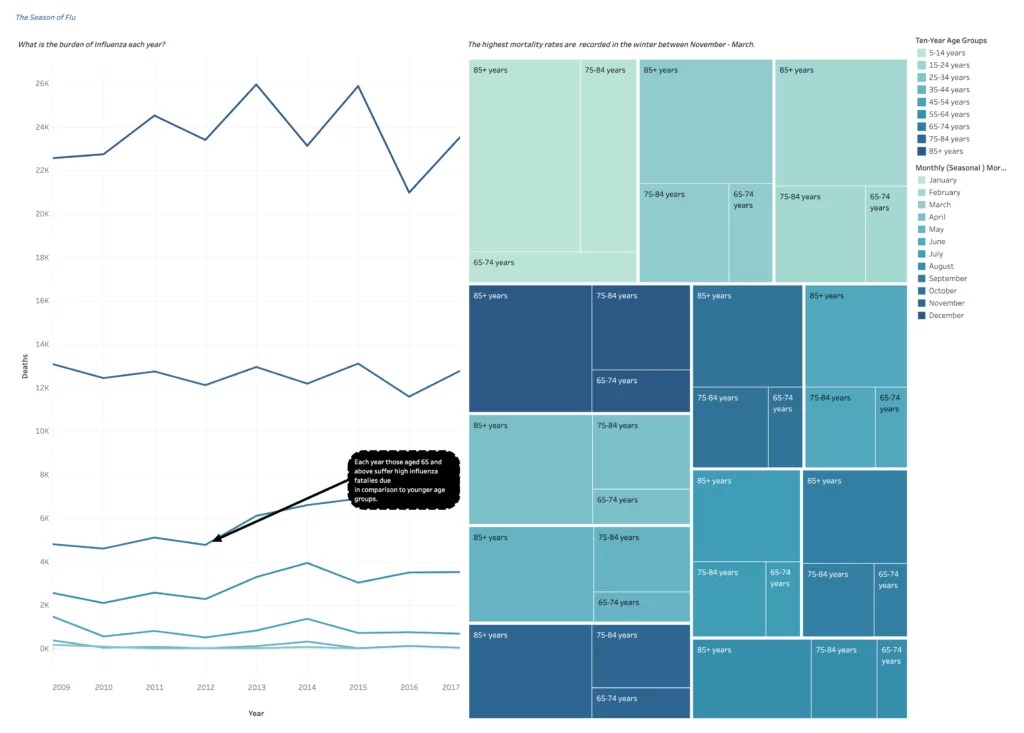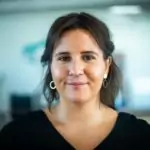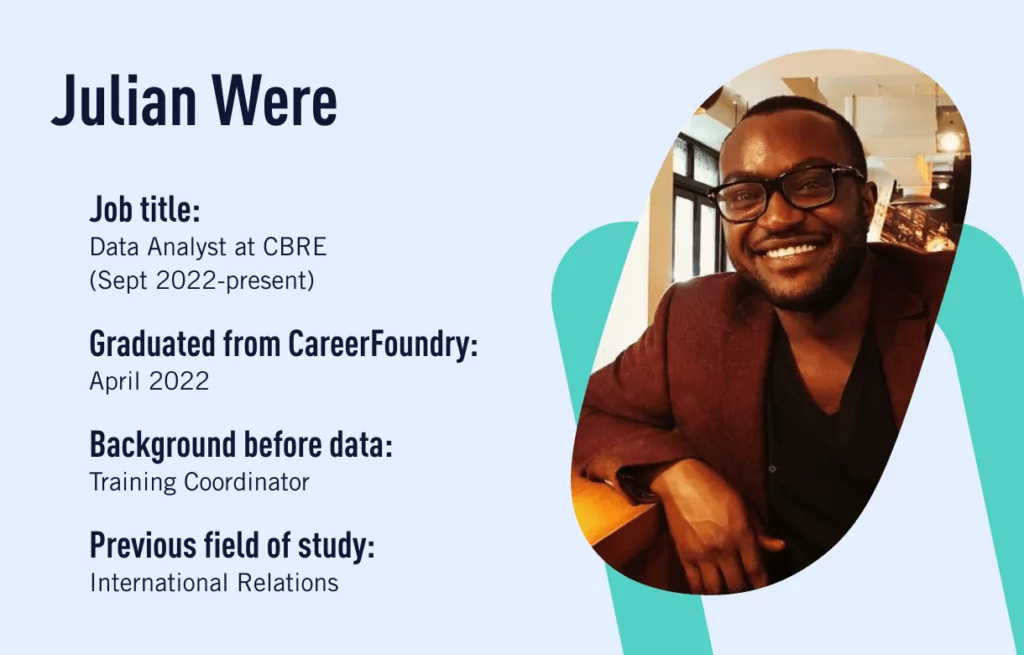
Starting a new career at the age of 30 might not be easy, but Julian is proof that it’s possible. After bouncing around between odd jobs in his 20s, things finally fell into place for him a few years back and he embarked on his career change into data analytics with CareerFoundry.
Having graduated from the Data Analytics Program, he kicked off his career as a data analyst at global real estate company CBRE, but this is just the beginning. His ambitions for a rewarding career in data took him one step further, and he’s now undertaking a postgraduate degree at The University of Edinburgh to become a data scientist.
I had the pleasure of talking to Julian recently and learning his story. Not only did I learn he’s good friends with Azadeh, a fellow CareerFoundry graduate I worked with for another article last year, but I also discovered his path to data analytics was filled with highs and lows—from mental health struggles to unsociable study hours to unwavering support from his career specialist at CareerFoundry.
It’s not every day you meet someone as kind, open, and dedicated as Julian, and it was a pleasure to hear his story. Here are some of the highlights from our conversation:
Hi Julian, thanks for talking with me today! To begin with, please could you tell me a bit about yourself and your background?
Hi Alison. Sure. I have an undergraduate degree in international relations. I studied that because I was interested in global affairs and I enjoyed politics at school, but there aren’t many jobs you can just jump into after graduation, so I bounced around from job to job in my 20s not really having a direction.
I’ll be honest, I never really had any kind of direction. I actually went to work at Facebook in a training coordinator role where I was managing a team of recruits. Most of them were students, and they all had directions in mind, for example, to become engineers.
I met someone there called Nas who worked in the security team. He told me he was doing a UX design course with CareerFoundry and told me to look into it. So I did, and I thought it looked really cool!
Then I talked to my mum about it. She saw me struggle throughout my 20s moving from job to job and she knows me better than anyone. I explained to her that CareerFoundry could help me make a career change, and it would really change my life. She had no questions—she believed in me and even helped with my tuition.
And since then, she’s continued to support me. She moved to Doha five years ago, where she works in the medical field, but she is always there for me. She’s amazing; I couldn’t have done it without her.
I’m also thankful to my dad. My family really kept me afloat during my career change.
What a great support system. So did you sign up for the Data Analytics Program right away?
At that point, I wasn’t sure data analytics was the right path for me and I didn’t want to pay outright for CareerFoundry when I wasn’t sure about my direction.
In my role at Facebook they had a LinkedIn learning service, so I could learn about data analysis and see if it was a good fit for me. I enjoyed it and I kept getting good results! So four or five months later I told Nas I was going to join CareerFoundry and I committed to the Data Analytics Program!
I also had some good advice from the team at CareerFoundry before I joined, like from Mike (McCulloch, Director of Outcomes). Switching careers at 30 can be overwhelming so I wanted to make sure everything made sense for me before signing up.
I see. Did you have a vision of becoming a data analyst at this point or were you just seeing where CareerFoundry took you?
Oh, I was single-minded, Alison. I was committed to becoming a data analyst! For me, there was no turning back.
I didn’t want to keep bouncing from job to job. I looked at inspiring people in my life, like my mum, who had purpose in their careers. I wanted a career for myself, and to do something meaningful.
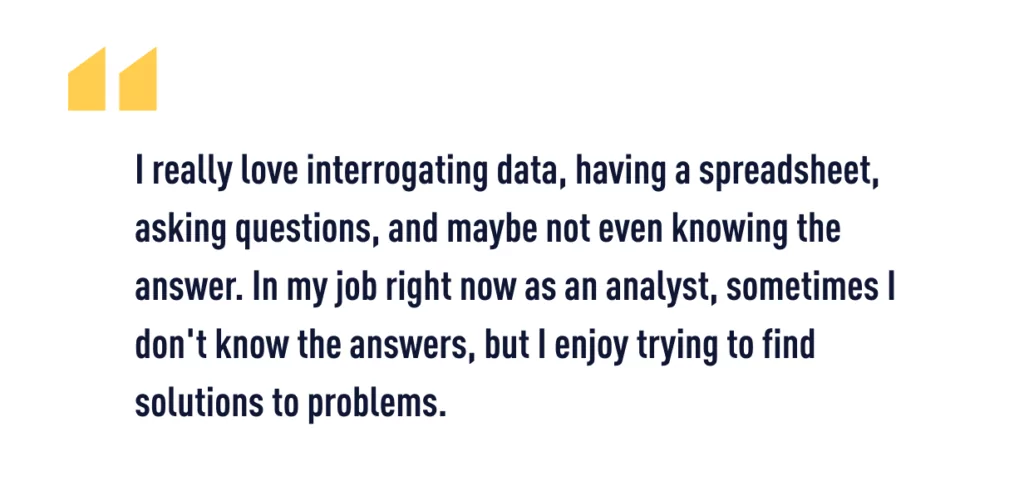
Let’s talk about the program itself. What was it like studying with CareerFoundry? What was the highlight for you?
It was a great experience. My highlight was the support I received throughout the program. My mentor, Toby Williams, was really supportive from the outset.
Towards the latter part of the course where you have help from a career specialist in the job preparation course, I worked with Melanie Kearsey. She changed my life! She’s just incredible.
Were you working at the same time, or had you left your job?
Actually, my bouncing around between jobs continued! I left Facebook and I got a sales job. Honestly, Alison, I’m not even a salesperson, so it wasn’t ideal for me and I was so depressed. Melanie, my career specialist, was a great support here too. There were a lot of mental health issues I faced—I’m sure we’ll touch on that later.
But yes, I was working in a sales position. The good news is that I got to work from home and in my spare time I was able to work on my Python or my R.
Did you have a study routine for fitting CareerFoundry in around your job?
Honestly? I studied all the time. I never had any structure—lunchtime, mornings, 2 a.m., I was studying.
A visualization from Julian’s Tableau project about influenza mortality rates. To see more of Julian’s work, visit his portfolio website.
Melanie told me I’m one of these personalities who put their mind to something and will do it. She’s right! I was so focused and single-minded and I think that helped me quite a bit. To me, it didn’t matter when I had to do the work.
What would you say was the biggest challenge you faced?
Mental health was something that I struggled with. I had massive depression—I still do, but I’m working through it. During the pandemic, I had just gone through a breakup too, so while there was nothing really about the course itself that was a huge challenge for me, the external factors hindered my progress.
But I had good support. Melanie started off as my career coach, she ended up being my life coach!
Thank you for being so honest and frank about your struggles. Do you have any advice that you would give to other students who are taking the course now and are struggling?
Yes, I can use an example to explain myself. I have a friend from university who works at Deutsche Bank now, and a year ago he sent me a LinkedIn message saying he was interested in CareerFoundry and wanted to know more about the course and how it works with career change. I thought he was happy in his job and he seemed very established in his career to me, but it reminded me about people’s desire to do something profound.
So whenever I get messages on LinkedIn like the one from my friend, I reiterate that it is a career change. It’ll be difficult, but that’s the whole point, right? It’s a change and it’s a journey.
So my advice is to remember the desire that brought you to CareerFoundry and use that drive to complete the course and carry on from there. Once you get that certificate, the learning still carries on. You need to have that dedication and willingness to complete the course and continue your learning afterward.
Great advice! And a good segue to my next question. What happened after you completed the program?
Before I finished the program, I was already applying for jobs. I was quite aggressive with applications. Melanie would do mock interviews with me—I know I keep saying it but she was really helpful!
I had a few big interviews that I should have nailed, but it just didn’t work out. Within six months of completing the program, I was preparing myself to cash in on the job guarantee and get my money back.
The job search was tough, but I knew it was just a matter of time, even if it took longer than six months. I kept saying to myself: “I will get a job.”
What challenges did you face in interviews?
I think the biggest challenge—and something I always tell anyone that wants to become a data analyst—is imposter syndrome. Starting a new career at 30 is challenging, and when you’re finally in a new role you’re thinking: “OK I’ve got the skills from CareerFoundry” but you’re also wondering: “Am I good enough?”
I also had a lot of people in interviews who weren’t familiar with CareerFoundry. So I learned that you need to explain it really well. It’s not just some easy online course that anyone can do. I had to tell recruiters that I have been learning for nine months, I have all the foundations for a career in data, and I have what it takes.
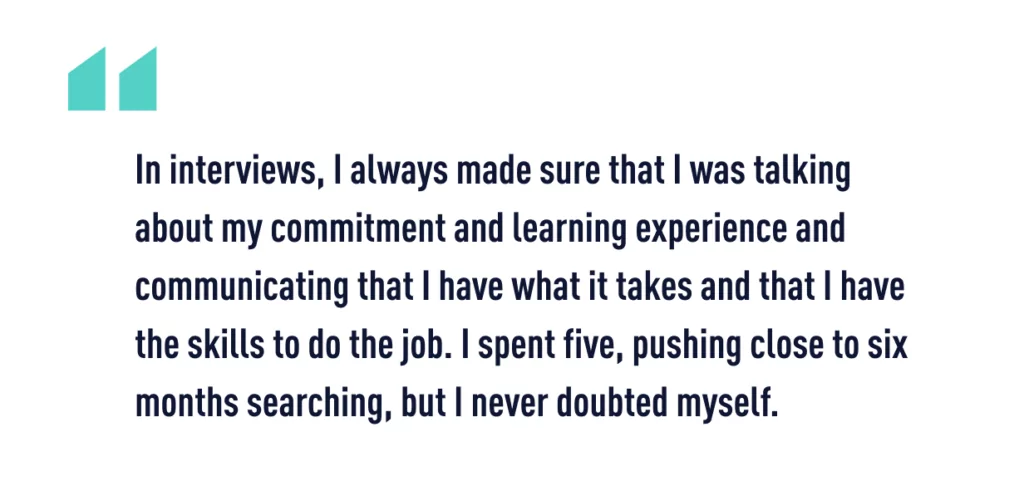
How did you come across your role with CBRE and how was the hiring process?
Out of the 500 job applications that I sent out, it just so happened that CBRE reached out to me. Richard, who is my manager now, interviewed me. I knew for a data analyst role the initial interview would likely be the first of three, so I asked Richard what the next step would be.
He said that maybe there would be a second round, but that they might just stop at the first for the right candidate. Within three days they phoned me and asked me to come on board! I was in shock, thinking “This can’t be possible!” Of course, I phoned Melanie. She was so happy for me.
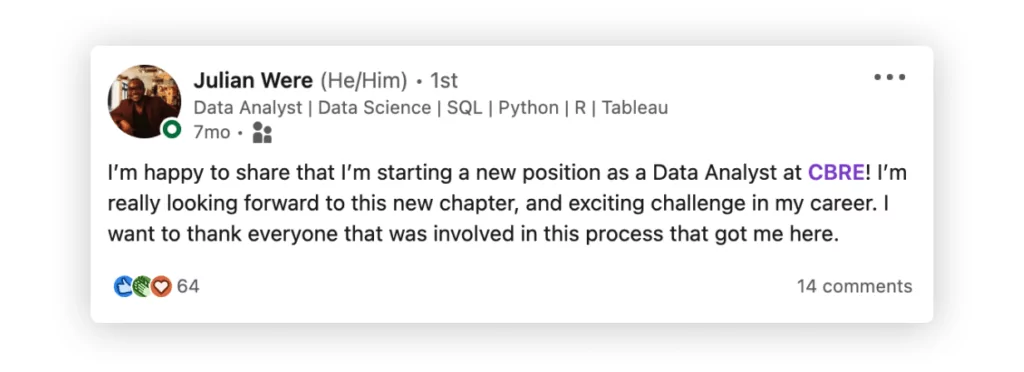
Congratulations! Could tell us a bit more about the company and your role?
CBRE is a great real estate company. I can’t really discuss the details too much but the client I am working with is a large pharmaceutical company
My role is a data analyst. I mostly focus on data visualization in order to present various findings to the client. It involves monthly dashboard reporting; I use Excel to interpret the data, and Tableau to create visualizations to present to the client.
I am studying data science now because I want to interrogate data and create algorithms in my work, but this is a good starting point.
How do you like working remotely?
It’s good. I tried to find a balance, you know, go out and exercise or go to the gym. As I’ve mentioned, mental health is very important to me so I do my best to take care of myself. Last year I did the Richmond Half Marathon for Mind charity, and I raised £640 in donations. Sorry, I know I keep talking about mental health, but it’s a big thing for me.
I’m pleased you’ve mentioned it. It’s so important and remote work has its challenges when it comes to mental health—like burnout or dealing with imposter syndrome as you mentioned before. With that in mind, what’s been the biggest learning curve you’ve faced so far in your career change?
I’d say just learning a lot about myself and what I’m willing to do for my career and for myself. CareerFoundry was great because there was an element of data science briefly included in the program, and I already knew at that point that I wanted to become a data scientist. I knew that being a data analyst is a stepping stone to getting there.
When I applied for my master’s at The University of Edinburgh, where I am now studying data science, I had to give an explanation as to why I should be in the program. And thankfully, going through this whole career change process allowed me to realize, finally, at age 31, this is where I wanted to be, and I know where I want to go next. That’s been the biggest learning for me.
I’m glad you figured it out. Do you have any advice for someone who’s starting a career in data from scratch?
Use all the tools that are available. Be it your tutor or your mentor at CareerFoundry, or articles on the CareerFoundry blog. I spend so much time online reading articles.
There are also plenty of networking and industry events you can join. I often attend online data events hosted on Meetup, LinkedIn, and the CareerFoundry online events.
That’s my advice: to use what’s around you and keep learning wherever you can.
Are there any specific websites, blogs, or podcasts that you’d recommend?
Absolutely. I’m a big fan of Women In Data, founded by Sadie St. Lawrence. Something that sticks with me from her is that, in data science, there are a lot of people who have bravado and arrogance, but Sadie said “I am not greater than, but I am not less than.”
That’s helped me deal with imposter syndrome. I can walk into meetings now and accept that I might not know everything, but I know my value. Most of this mindset stems from my time at CareerFoundry.
That’s great to hear. How do you feel your life has changed since starting a new career at 30?
It’s given me a whole new direction and perspective. Thinking back to that chat with Nas at Facebook when I first heard about CareerFoundry—imagine how crazy life could be if that conversation didn’t happen! I would probably still be bouncing from job to job, still trying to make sense of it all. Chance encounters like that can make all the difference.
I sent Nas a message when I graduated and I said thank you because now things have changed. I have purpose. I have a reason. I’m enjoying my master’s. I will be graduating next year, and from there, it’s all onwards and upwards.
How do you see the new few years playing out?
Graduate with my data science qualification, and then maybe get married because I’ve been getting a bit of pressure from the family! But continued learning is my focus right now.
I was speaking to my fellow CareerFoundry friend Azadeh about a five-year plan recently. I’ll be 36 by that point, so I know I’ll be in a data science role by then. I’m not the person that sits at the computer coding for nine hours a day. I want to manage a team. I want to help people and see them grow.
Amazing. I’m confident you’ll get there! Thank you so much for sharing your story with me, Julian.
So, is 30 too old to start over? If you’ve read this far then hopefully you realize the answer is no! It’s never too late if you dedicate yourself to making a change, leverage your previous experience, and utilize the resources and connections available to you. For more tips on how to make a successful career change at 30, check out this article.
If you’re thinking of making a change but aren’t sure where to begin, book a call with an expert program advisor at CareerFoundry. They’ll help you figure out if a career in tech is right for you. If you’re curious to see if data analytics is a good path for you, try this free introductory short course.
Want to hear from others who made a career switch at the age of 30? Check out these success stories from other CareerFoundry graduates who all made exciting career transitions in their 30s:
- How I Retrained And Became A UX Designer After Turning 30
- From Finance to UX Design in the Space of a Year: How An Online Bootcamp Changed My Life
